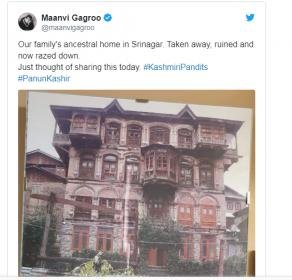With an indefinite security lockdown in place in Indian-occupied Kashmir (IoK) and elected representatives under house arrest, India's ruling party on Monday revoked the special constitutional status of occupied Kashmir through a rushed presidential order.
Home Minister Amit Shah also moved a bill to bifurcate the state into two union territories – Jammu Kashmir as one and Himalayan Ladakh region as the other.
With the special status repealed, people from the rest of India will now have the right to acquire property in occupied Kashmir and settle there permanently. Kashmiris fear this will lead to a demographic transformation of region from majority Muslim to majority Hindu.
As parliament debated the move, Indian media reported that the government has moved 8,000 Central Reserve Police Force (CRPF) from different parts of the country to IoK. The Indian army and air force have also been placed on high alert.
Explainer: What does India's proposed change to occupied Kashmir's status mean?
A statement issued by the home minister said that "Jammu and Kashmir will be a union territory with legislature while Ladakh will be a union territory without legislature".
Chaos in the house
Home Minister Amit Shah, president of India's ruling Bharatiya Janata Party (BJP), addresses the Indian parliament on Monday. — Photo courtesy ANI Twitter
Chaos erupted in the upper house of the Indian parliament as opposition lawmakers shouted slogans and started protesting after Home Minister Amit Shah urged members to discuss the legislation that seeks to end the autonomous status for Muslim-majority Kashmir.
Shah, who is also the president of India's ruling Bharatiya Janata Party (BJP), proposed that all regulation under Article 370 will not be applicable after a presidential nod, reported India Today.
After Shah proposed that the regulation under Article 370 will not be applicable after Presidential nod, the Rajya Sabha witnessed massive uproar with the opposition slamming the centre over the move, reported India Today.
Leader of the Opposition in the Rajya Sabha Ghulam Nabi Azad said that the BJP had "murdered the constitution today".
Parliamentary affairs minister Pralhad Joshi sought to reprimand the opposition, reported Hindustan Times. “Amit Shah is rectifying the historical blunder of Jawaharlal Nehru,” Joshi told the opposition benches about the resolution that had been on the agenda of the ruling BJP for years.
Amit Shah said Article 370 was used as "vote bank politics" and the earlier governments lacked the political will to revoke it. "But the Modi government has the political will and we are not bothered about vote bank politics," Shah said.
The move by India's Hindu nationalist-led government to revoke the special constitutional status, which allows only residents to buy property and hold state government jobs, is the most far-reaching move on the disputed Himalayan region in nearly seven decades.
Cabinet meeting
A cabinet meeting on the security situation in Indian-occupied Kashmir was held at the residence of Prime Minister Narendra Modi on Monday morning. — ANI Twitter
A cabinet meeting was held on Monday morning at Indian Prime Minister Narendra Modi's residence.
Journalists as well as opposition members in India have been questioning the reasoning behind the clampdown as well as placing former IoK chief ministers — Omar Abdullah and Mehbooba Mufti — under house arrest.
Read: Former IoK chief ministers Mufti, Abdullah placed under house arrest; curfew-like restrictions imposed
"While there has been no word from the government on the plan of action, speculation has been rife," the Indian publication added.
The cabinet meeting was held amidst a flurry of activity in the disputed region. The clampdown imposed late Sunday night has left millions stranded in their homes as authorities also suspended some internet services and deployed thousands of fresh troops around the increasingly tense region.
According to India Today, Indian opposition leaders also met in the parliament on Monday morning to discuss the security situation in Jammu and Kashmir.
Opposition leader Azad met with various party leaders in his office and discussed the security situation.
Threat to scrap occupied Kashmir's special status
The two leaders place under house arrest — Abdullah and Mufti — had earlier warned the Centre against abrogation of Article 35A and Article 370, which gives special status to Kashmiris.
National Conference president Farooq Abdullah, reading out a resolution adopted at a meeting of regional parties, said they have decided to send delegations to meet the president, the prime minister and leaders of various political parties to apprise them of the consequences of any attempt to abrogate Article 370 and Article 35A of the constitution or carry out delimitation of constituencies or trifurcating the state, reported India Today.
The ruling BJP in India has consistently advocated an end to occupied Kashmir’s special constitutional status, which prevents outsiders from buying property there, arguing that such laws have hindered its 'integration' with the rest of India.
On Sunday, The Hindu reported that additional security troops had been placed in civilian installations and police stations and were put on “standby mode.”
The Indian government has admitted that 10,000 extra troops were sent to IoK a week ago. Media reports on Friday said a further 25,000 had been ordered there.
Kashmir politicians had long raised fears that the troops are sign that the Hindu nationalist government could carry out a threat to scrap occupied Kashmir's special status under the constitution.
Curfew-like restrictions
Late on Sunday night, the Indian government imposed curfew-like restrictions in the restive region while India sent in tens of thousands of additional troops.
Communications were cut, with private mobile networks, internet services and telephone landlines cut, an AFP reporter said.
"There shall be no movement of public. All educational institutions shall also remain closed. There will be a complete bar on holding any kind of public meetings or rallies during the period of operation of this order. Identity cards of essential services officials will be treated as movement passes wherever required," read an Indian government order, but added: "there is no curfew in place".
https://www.dawn.com/news/1498227/i...rushed-presidential-decree-parliament-debates






